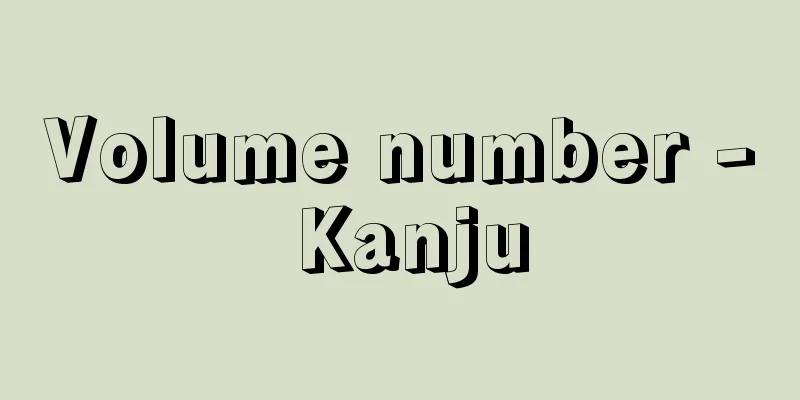Total war

|
A war not fought solely with military force, but with the men, materials, and ideology of an entire nation. The First World War, which began in August 1914 (Taisho 3), was a completely new war in terms of its form, appearance, methods, and scope compared to previous wars. It was characterized by mass consumption, mass mobilization, and mass destruction, and raised the establishment of a total war system that mobilized the economy, ideas, and spirit as its greatest challenge. Léon Daudet of the French Action Française summarized this form of warfare, which required the establishment of a total war system, as the concept of total war, and wrote La guerre totale (Total War) in 1918. It was German general Erich Ludendorff who popularized the concept of total war in 1935 with the publication of Der totale Krieg (Total War of the Nation), which had a major impact on the Japanese Army. Ludendorff believed that in the wars that were expected to break out after World War I, it would be necessary to mobilize the entire material and mental capabilities of the nation and its people, and to face the war as the nation's total strength. He presumed that mass mobilization of military forces would be achieved through the thorough implementation of universal conscription, and that the development of heavy industry and rapid technological advances would lead to the mass production and mass use of modern weapons. Naturally, this would lead to the intensity and annihilation of the war's aspects, as well as the mass and mobility of the means of war. The Japanese Army, which recognized the need for preparations for total war based on Ludendorff's arguments, began research and preparations for a total war system within the country as early as World War I, and in the process took the lead in building a total war system and strengthened its political voice. World War II was a more thorough total war, and the devastation of the war was significantly more severe than that of World War I. The total war's totalization made it difficult to end the war, and made postwar cleanup even tougher. However, the emergence of nuclear weapons made total war impossible, and it can be said that the opportunity for the emergence of total war as a form of warfare was effectively over. Although "total war" can sometimes be translated as "total war," "total war" is more commonly used. [Kokatsu Atsushi] "Research on the Total War System" by Atsushi Kokatsu (1981, Sanichi Shobo) Source: Shogakukan Encyclopedia Nipponica About Encyclopedia Nipponica Information | Legend |
|
軍事力だけの戦争でなく、国家全体の人員、物質、イデオロギーを用いて行う戦争。 1914年(大正3)8月に開始された第一次世界大戦は、それまでの戦争と比較して、戦争の形態、様相、方法、領域などの面でまったく新しい内容をもつものであった。それは大量消費、大量動員、大量破壊を特徴とし、経済、思想、精神動員を内容とする総力戦体制確立を最大課題として提起した。この総力戦体制確立を必須(ひっす)とした戦争形態を、フランス王党アクシオン・フランセーズのレオン・ドーデは総力戦という概念で要約し、1918年『総力戦』La guerre totaleを著した。総力戦概念を一般に定着させたのはドイツの将軍エーリヒ・ルーデンドルフで、1935年に『国家総力戦』Der totale Kriegを刊行し、日本陸軍にも多大の影響を与えることになった。ルーデンドルフは、第一次大戦後に生起すると予想された戦争においては、文字どおり国家および国民の物質的、精神的全能力を動員結集し、これを国家の総力として戦争に臨む必要があり、国民皆兵主義の徹底化による兵力の大量動員を前提とし、重工業の発達と技術の飛躍的進歩を基盤とする近代兵器の大量生産、大量使用を必然化するとした。そこから当然、戦争様相の激烈性、殲滅(せんめつ)性と戦争手段の大量性、機動性を招来するとした。これらルーデンドルフの所論から、総力戦準備の必要性を認識した日本陸軍は、早くも第一次大戦中から国内における総力戦体制の研究準備を開始し、その過程で総力戦体制構築の主導権を握り、政治的発言権を強めていった。 第二次大戦は、より徹底した総力戦となり、戦争の惨禍は、第一次大戦と比較して著しく深刻となった。総力戦の徹底化による戦争の全体化は戦争終結を困難にし、さらには戦後処理を厳しいものとした。しかし、核兵器の出現によって戦争の全面化は不可能となり、総力戦という戦争形態の出現の機会は事実上終わったといえる。なお、total warを全体戦争と訳す場合もあるが、総力戦という訳のほうが一般的である。 [纐纈 厚] 『纐纈厚著『総力戦体制研究』(1981・三一書房)』 出典 小学館 日本大百科全書(ニッポニカ)日本大百科全書(ニッポニカ)について 情報 | 凡例 |
Recommend
Theory of Observability
When a target system is represented as a linear dy...
Aglaonema crispum - Cross-legged sleeping crispum
...Aglaonema nitidum Kunth, which is slightly lar...
Platinum
... Periodic table Element symbol = Pt Atomic num...
Frankel, Joseph
Born: May 30, 1913. [Died] January 13, 1989. Briti...
Ginkakuji Temple
This is the common name for Higashiyama Jisho-ji T...
Karlstadt, L. (English spelling) KarlstadtL
…His main stage was in Munich throughout his life...
Takakage Shijo
Year of death: 3rd year of Joji/19th year of Shohe...
Onkoku
…There are also cases where the hot spring itself...
Almas
Almace: A fictional weapon. It is said to be the f...
Nasrid Dynasty - Nar
The last Islamic dynasty in the Iberian Peninsula...
Mariana Islands - Mariana
An archipelago of volcanic and elevated coral isla...
Tanuma [town] - Tanuma
A former town in Aso County in southwest Tochigi P...
Elfric - Elfric
…The former is organized by text, while the latte...
Perissodactyla
…a group of hoofed, herbivorous or folivorous mam...
Illumination (manuscript painting) - Illumination
…Illustration, like illumination, is derived from...









![Kikuyo [town] - Kikuyo](/upload/images/67cb4fd7523da.webp)